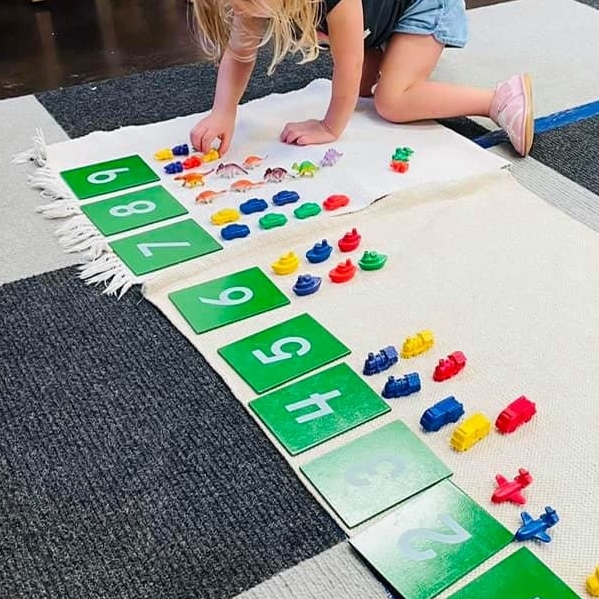Village Montessori Blog
Why Montessori and How it Compares to Traditional Daycare

Choosing between traditional daycare and a Montessori education is simple when you consider how children’s brains learn, which is by explicit introduction of material, lots of repetition and hands-on learning that make tactile connections with the brain.
The Montessori approach stands out for its ability to foster independence and provide materials that extend beyond an age-specific curriculum. While traditional daycare provides supervision and group play, a Montessori environment nurtures a child’s natural inclination to learn by incorporating freedom of choice and movement.
Here’s a look at why the Montessori approach offers a richer educational experience for young children.
1. Concrete Learning: Engaging the Senses for Real Understanding
Montessori materials are designed to engage all senses, making learning more concrete and memorable. Unlike traditional daycare’s passive learning, Montessori activities encourage children to explore and manipulate materials that teach size, shape, color, and other essential concepts. This hands-on approach helps children build lasting knowledge through real-world connections.
2. Learning by Doing: Building Real-Life Skills
Montessori emphasizes practical, hands-on activities like pouring, buttoning, and tying that build fine motor skills and concentration. These tasks not only support everyday self-care skills but also foster self-confidence and independence. Traditional daycare often focuses on group play, but Montessori’s purposeful activities empower children to explore their individual abilities and interests.
3. Child-directed: Empowering Self-Learners
In Montessori, children choose their activities and manage their time within a structured environment, which nurtures independence and decision-making. Traditional daycare often centers on teacher-led activities, which can limit children’s ability to self-direct. Montessori’s child-centered approach allows kids to take charge of their learning once a lesson has been demonstrated to them, boosting confidence and resilience.
4. Mixed-Age Classrooms: Learning from Peers
Montessori’s mixed-age classrooms allow children of various ages to learn together, with younger children observing older peers and older children reinforcing their knowledge by helping younger ones. This arrangement encourages empathy, cooperation, and a sense of community that is harder to cultivate in traditional age-segregated daycare settings.
5. Small Class Sizes: Personalized Attention
Montessori classrooms are typically smaller, enabling teachers to give individualized attention to each child. This approach supports each child’s unique developmental path, allowing teachers to observe and guide their growth. Traditional daycares, with large numbers of children in classrooms, may not always be able to provide the same level of personalized support.
6. Grace and Courtesy: Social Skills for Life
Montessori classrooms emphasize grace and courtesy, teaching children how to interact respectfully and thoughtfully with others. Through daily practice, children learn manners, patience, and kindness, which builds emotional intelligence and prepares them for social interactions beyond the classroom.
7. Prepared, Orderly Environment: A Peaceful Space for Learning
Montessori classrooms are calm, organized, and designed to promote focus. Each item has a designated place, fostering a sense of responsibility and respect for the environment. This contrasts with many daycare settings, where toys and materials may not be as purposefully arranged. The order and beauty of a Montessori classroom create an ideal atmosphere for concentrated, joyful learning.
The Montessori approach offers a unique blend of self-directed learning, hands-on experiences, and structured social interaction. By choosing Montessori over traditional daycare, parents provide their children with an environment that supports growth in every dimension—academically, emotionally, and socially. Montessori not only nurtures essential skills but also builds a strong foundation for lifelong learning and personal development.
To experience the Montessori approach in action, and schedule a tour at one of the top-rated Montessori preschools in Fort Mill, visit Village Montessori & Preparatory School.
